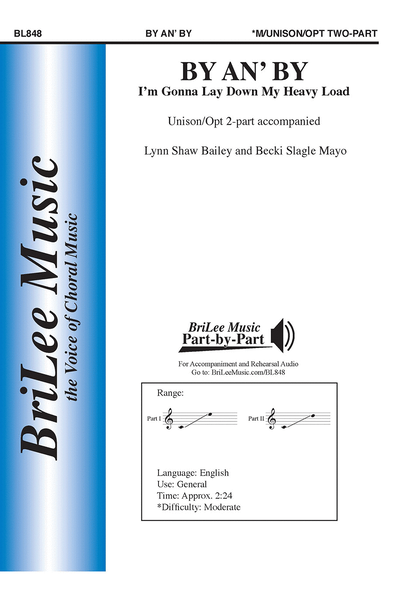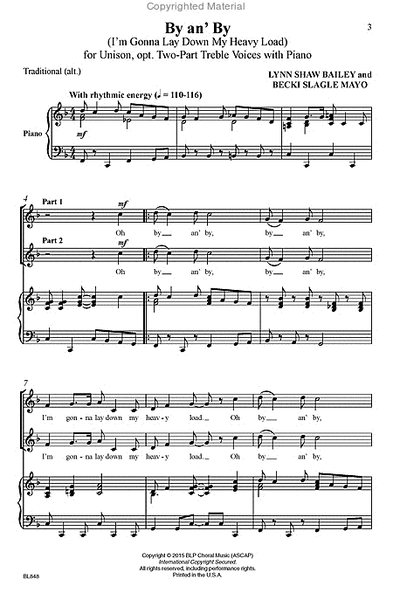By An' By
I'm Gonna Lay Down My Heavy Load
-
Ships in 1 to 2 weeks
Details
Description
SKU: CF.BL848
I'm Gonna Lay Down My Heavy Load. Composed by African American Spiritual. Arranged by Becki Slagle Mayo Lynn Shaw Bailey. Fold. Octavo. With Standard notation. 8 pages. Duration 2 minutes, 24 seconds. BriLee Music #BL848. Published by BriLee Music (CF.BL848).UPC: 672405008488. 6.875 x 10.5 inches.
I'm gonna lay down my heavy load (in the By an by) is the theme of this fantastic spiritual, wonderfully captured in this arrangement for two-part voices and piano. Its upbeat, syncopated melody utilizes a pentatonic scale and rhythms with a swing feel. Partnered with the well-known gospel jewel When the Morning Comes, choirs of all abilities will sound phenomenal when singing this concert-closing tune.
While African American spirituals and gospel songs are rich in cultural and historical meaning, they are perhaps treasured most for their unique ability to bring hope and joy to the deepest levels of the despairing human soul. Their origins are thought to be a fusion of eighteenth and nineteenth century melodies of enslaved people in America, western harmonies and Christian faith, along with the syncopated rhythms and segmented melodies of African music.Established in 1867, much credit for preserving and popularizing sacred African American folk songs throughout the world is owed to the leaders of the historically black Fisk University. George L. White (1838-1895), an anti-slavery activist, served as Fisk University’s first treasurer and music director. Seeking a solution to the university’s growing financial difficulties, White gathered and skillfully trained a small student chorus to go on tour in order to earn money for the university. Between 1871 and 1880, the Fisk Jubilee Singers embarked on a series of fundraiser concerts thatintroduced black spirituals to audiences in the United States, England and Europe. Their success helped keep the university open. Today the Fisk Jubilee Singers continue their traditions of singing African American spirituals around the world.John Wesley Work, Jr. (1873-1925), a Fisk University graduate and music professor, is often recognized as the first collector of African American folk songs and spirituals. His work, along with his brother, Frederick J. Work (1871-1925), links us to many of the songs from this genre.By and By is typical of a class of spirituals with an upbeat syncopated and segmented melody. Utilizing a pentatonic scale, the rhythm features a swing feel. The verses of this song were likely sung in a “call and response” style, another characteristic of spirituals.When the Morning Comes was written by Charles Albert Tindley (1851-1933), an African American Methodist minister and composer. Also known by the title We’ll Understand It Better By and By, this gospel jewel is one of his best known songs. Sources also trace the history of the 1950s and 1960sCivil Rights Movement anthem We Shall Overcome, in part, to the lyrics of Tindley’s gospel song, I’ll Overcome Someday.When singing By an’ By the unified execution of vowels will do much to produce a pure sound and improve intonation. Among these, diphthongs can be the most troubling. In the word “by,” the two vowel sounds found in the ‘long-I’ (IPA: aɪ) are “AH+ee.” Sustain the “AH” portion of thediphthong, then move quickly and away from the vanishing sound “ee.”African American composer and arranger, Harry Thacker Burleigh (1866-1949), is credited with introducing the concept of the spiritual as an art song, making them known to the finest musicians.His recommendations:Success in singing Folk Songs is primarily dependent upon deep spiritual feeling. The voice is not so important as the spirit, and then rhythm. Their worth is weakened unless they are done impressively, for through all of these songs there breathes a hope, a faith in the ultimate justice and brotherhood of man. The cadences of sorrow invariably turn to joy, and the message is ever manifest that eventually deliverance from all that hinders and oppresses the soul will come, and man—every man—will be free.


 Share
Share